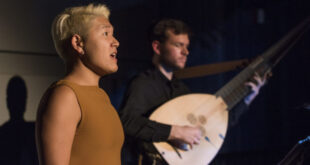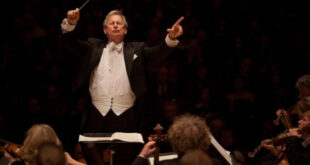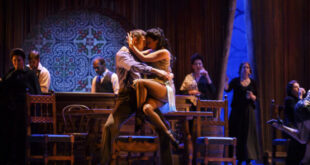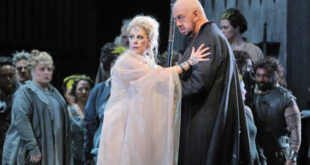 In the 2013-14 season, Lyric Opera of Chicago is presenting three operas that are all in the very first circle of popularity, and have been for many years — Puccini’s “Madama Butterfly,” Verdi’s “La traviata” and Rossini’s “Il barber di Siviglia.” Many who have never seen an opera or know anything about the genre have at least heard of these works. So it may seem unbelievable that all three of these masterpieces, on their opening nights, were pathetic flops! In retrospect, however, there are understandable reasons for this in each case.
In the 2013-14 season, Lyric Opera of Chicago is presenting three operas that are all in the very first circle of popularity, and have been for many years — Puccini’s “Madama Butterfly,” Verdi’s “La traviata” and Rossini’s “Il barber di Siviglia.” Many who have never seen an opera or know anything about the genre have at least heard of these works. So it may seem unbelievable that all three of these masterpieces, on their opening nights, were pathetic flops! In retrospect, however, there are understandable reasons for this in each case.
For the first time, Puccini was so confident in the success of “Madama Butterfly” that on Feb. 17, 1904, he actually brought his wife and son to the opening night of one of his operas, this time at La Scala. And why not? His last three operas, “Manon Lescaut” (1893), “La bohème” (1896) and “Tosca” (1900) had all been rousing triumphs, and Puccini was now unquestionably recognized as the “new Verdi” — the reigning king of Italian opera. The premiere also boasted three of Italy’s greatest singers — soprano Rosina Storchio, tenor Giovanni Zenatello and baritone Giuseppe De Luca.
But there were partisans of other composers who envied Puccini’s success, and some of these plotted to do anything they could to spoil the premiere. Then there were problems brought on by the composer himself. As usual, during the creative process, he had many violent quarrels, some lasting all night long, with his libretto team of Luigi Illica and Giuseppe Giacosa, who had penned the texts of his last two operas. It took all of publisher Giulio Ricordi’s powers of persuasion to keep Giacosa from quitting when the work was not even halfway completed.
Perhaps the biggest bone of contention was over the dramatic structure of the opera. Initially Puccini had agreed to Illica’s three-act concept, with the second act set in the American consulate. But early on, the composer scrapped this idea in favor of a long two-part second act set in Butterfly’s house — with no intermission! This was a very touchy proposition for Italians, who feared the growing influence of Wagner, with his interminably long acts. And typically, Puccini procrastinated on the musical composition and orchestration, so much so that it negatively affected the actual rehearsal time for the production. So Puccini might well have been confident, believing that he had composed his most musically brilliant opera, but there were quite a few other people associated with the work who had serious misgivings about the premiere.
Unfortunately, those who feared the worst proved to be correct. The first performance of “Butterfly” was a nightmare. Puccini’s enemies came out in force and booed and hissed at every opportunity. At one point, a gust of air billowed up Storchio’s kimono and someone shouted out, “Butterfly is pregnant!” setting off waves of laughter and hoots of derision. Then in the long instrumental interlude between the first and second parts of Act Two, some recorded birdsongs were played for atmosphere. But this just elicited a cacophony of animal cries and catcalls. And the second act was indeed far too long, and many spectators up and left early.
After the disastrous premiere, Puccini himself declared an end to the production and refunded his composer’s fee. But he knew that he had composed basically a fine opera, so he set about revising it. He did a minimum of re-writing, added a bit more music for the tenor and, most importantly, split up the second act into two parts, divided by a second intermission. When the revised work was presented in Brescia, it was a huge success.
The director of this Lyric production, Louisa Muller, is faithfully reviving the production conceived by Michael Grandage, who apparently assumes that the attention span of today’s audience is greater than Puccini’s original one, so the opera will be presented with just the one intermission after the first act. (Make sure you go to the bathroom and get all your goodies then!) Designer Christopher Oram will give us the first new set we have seen in Chicago for “Butterfly” in almost 40 years. The setting will happily be in 19th-century Japan, where it belongs.
This opera is so popular that it will be staged twice — in October and January. For the January performances, Cio-Cio-San will be performed by soprano Patricia Racette. Making his Lyric debut as Pinkerton is Italian tenor Stefano Secco, while Sharpless will be played by another newcomer to the Chicago stage, baritone Christopher Purves. Conductor Marco Armiliato will also make his Chicago debut.
Performances will be January 11, 14, 17, 20, 23 and 26. To purchase tickets call 312-332-2244 or visit www.lyricopera.org.
 Fra Noi Embrace Your Inner Italian
Fra Noi Embrace Your Inner Italian








